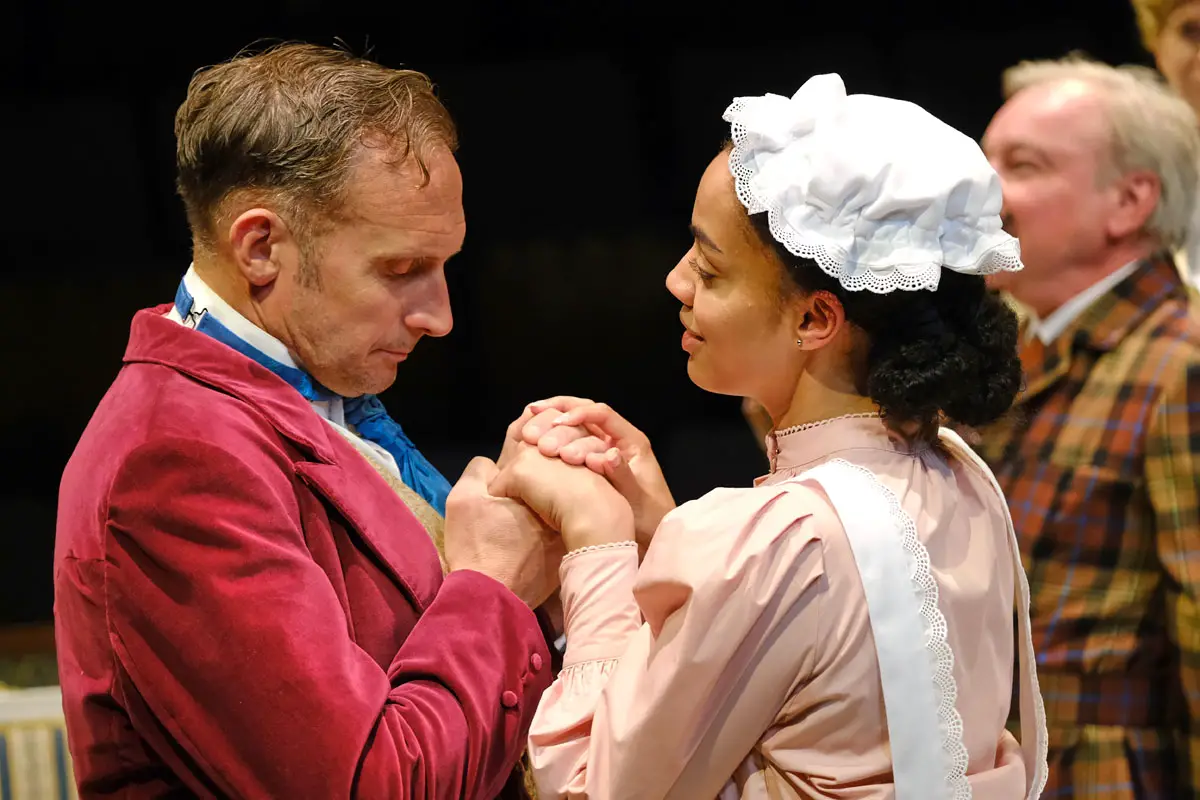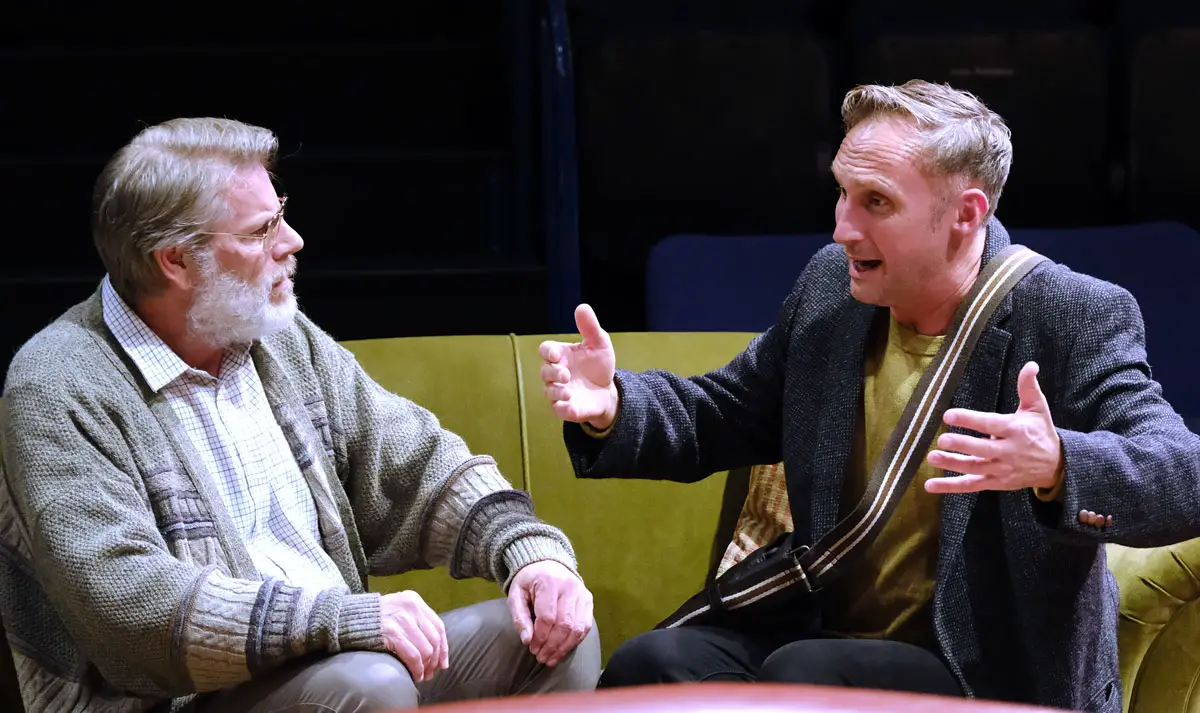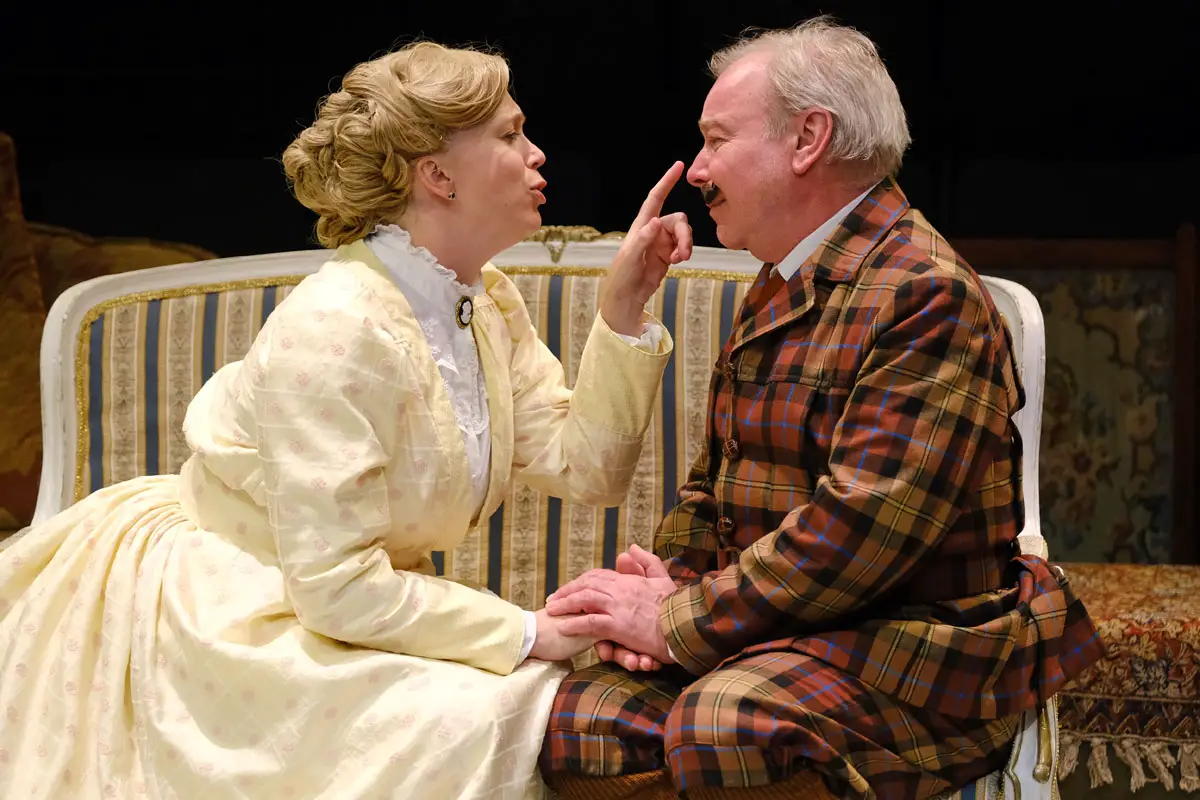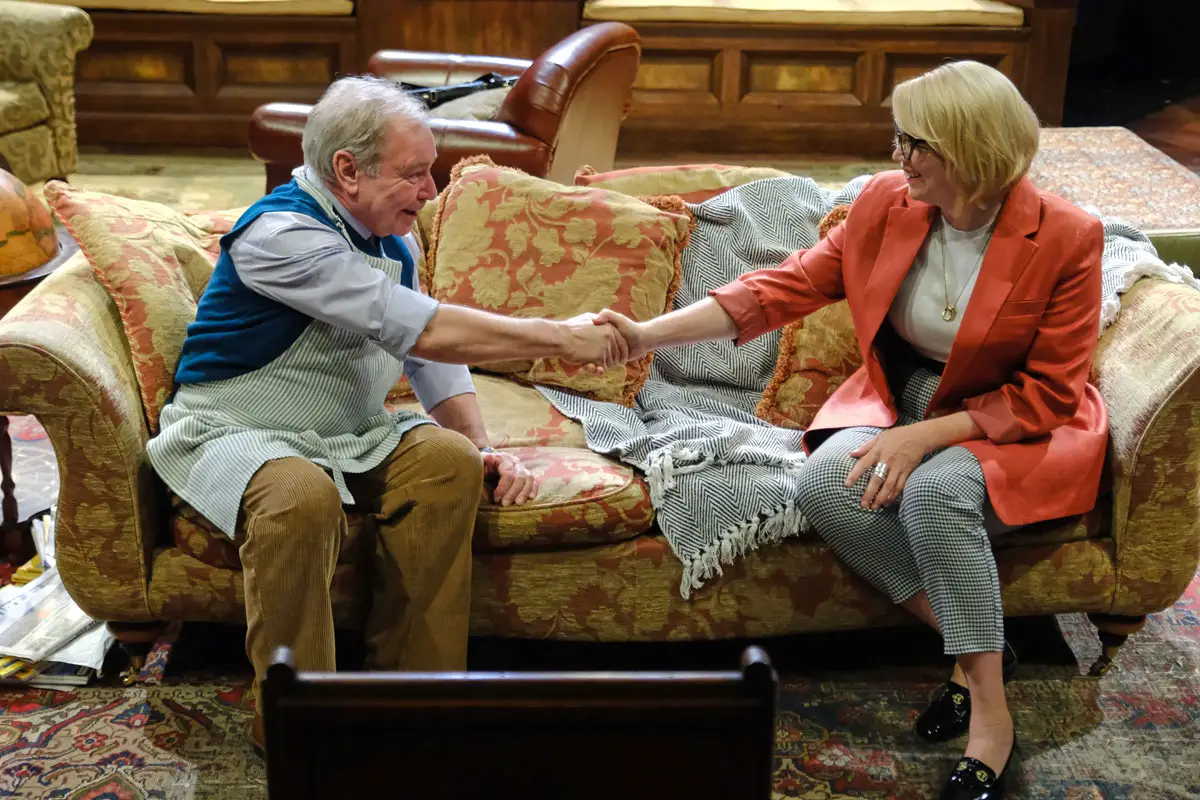Show And Tell – Review – Stephen Joseph Theatre

By Elizabeth Stanforth-Sharpe, September 2024
Alan Ayckbourn, then writing under the pseudonym Roland Allen, had the world premiere of his first play performed in the theatre-in-the-round at The Library Theatre in Scarborough 65-years ago, and all but a handful of the next 20 plays were first performed in that space. The Library Theatre, which was used until 1976, was an intimate area with only two stage entrances, both on the same side of the round, one of which also admitted the patrons and the other which led to the changing rooms.
Hence, those early plays were written with only two entrances and the close proximity of the audience to the actors often produced some surprising, loud interjections. Company and audience members shared one single toilet. The layout allowed Ayckbourn to write farces filled with misunderstandings, disguises, comedic arrivals and departures, the layering of two or more converging situations, and plays-within-plays, whilst all the time developing the astute observation of the minutiae of human relationships that have become a signature of his work. Seats weren’t allocated – you bought your ticket, turned up, and sat where you could – the experience was very much akin to being entertained in someone’s front room.
Show and Tell is Ayckbourn’s 90th play, premiering in his eighty-fifth year. His career has remained firmly rooted in Scarborough’s Stephen Joseph Theatre, yet it has also allowed him to experience theatre in all its forms. He has witnessed the financial excesses of Broadway, the idolisation of directors, the excessive growth of add-on industries, the acute lack of government funding and the refusal to acknowledge how fundamentally important the arts are to everyone.
“Controlled”
He has seen theatres forced to close and actor training centres vanish. Prolonged lockdown restrictions have pushed actors to leave the profession as they struggle to make ends meet with work that is temporary, poorly paid, and offers no guarantees of future employment once a show ends. The agent-client dynamic often presents a catch-22, while audiences are increasingly unable to afford tickets. Despite these challenges, theatres have fought back by pooling resources to keep productions alive.
Ayckbourn has witnessed all this with a keen sense of nuance and significance, yet his passion for theatre has never waned. Show and Tell is an outpouring of that love, reflecting on the complexities of the industry but ultimately returning to the basics of those Library Theatre performances. It’s a full circle that reminds us what truly matters in theatre: the connection between the performers and the audience.
And how does he do this? By employing, in part, farce – but farce with a very controlled purpose, and metatheatrical devices such as a play-within-a play, eavesdropping, and ‘breaking the fourth wall’. That all sounds terribly high-brow and Shakespearean. In lesser hands, it might well be, but in Ayckbourn’s brilliance it becomes an hilarious show about an elderly gentleman who is planning a birthday surprise for his wife, in circumstances that are not all as they first appear.
“Gently unwinds”
Bill Champion, who has appeared many times at Stephen Joseph Theatre, is wonderful in the role of Jack Bothridge, a retired managing director who was not well liked when he was working and in retirement is growing ever more forgetful and delusional. His wife, Alice, loves the theatre, but doesn’t venture out too much these days, so what better than a birthday treat of a performance by the Homelight Theatre Company who specialise in bringing theatre into people’s homes.
Ben Wilkes is the only one of Jack’s former colleagues who has stayed in touch, but is it devotion or something else that keeps him there? Are their confused games of chess metaphors for something deeper? Paul Kemp is gloriously cast as the ambling, cautiously self-effacing Ben, who gently unwinds his story like cotton from a spool, draws out the pathos that makes the humour work so well, but shows a fabulously portrayed different side to his personality when called upon to do so.
Richard Stacey is another much-loved favourite of Stephen Joseph Theatre audiences. In Show And Tell he plays Peter Reeder, an actor in the Homelight Theatre Company. The company is small, struggling, and needs to take every gig they can in order to survive. They do every aspect of the production themselves, from delivering publicity leaflets, through taking bookings, setting up the stage and managing the lighting and sound. Jack has booked the group, but Peter’s first task is to unscramble exactly what he is expecting, with little success. He moves from congenial to confused to accomplished thespian with seamless credibility and strongly conveys the message that performance doesn’t need to be complicated to be effective.
“Streaming with laughter”
It’s so lovely to see Frances Marshall back at Stephen Joseph Theatre – we last saw her, heavily pregnant, in Family Album two years ago. She is playing Harriet (Harry) Golding, the founder of the company, who pragmatically recognises that she is running a business just like every other business, which has salaries to pay and overheads to be met. Jack’s booking might be fraught with difficulties, but he’s paying them well and they can’t afford to back out.
Stephen Joseph Theatre has a long history of encouraging talented young people, both on and off stage. Jodie Comer, the late Emma Chambers, Joanne Froggatt and Billy Howle are a tiny sample of the actors who had their first taste of professional theatre there. Olivia Woolhouse makes her own professional debut in Show and Tell, playing Steph Tate, a role which showcases an ability to slide with ease and authority between two quite different character values. It’s a very promising beginning, and I’m confident that we’ll all be seeing much more of Woolhouse in the future.
Show and Tell is funny. I had eyes streaming with laughter at several points, but it’s hard to say why without giving away too many secrets. There’s that deeper level beneath – the show has some salient points to make, but at its core it is a celebratory ode to the theatre that Ayckbourn loves dearly, written and performed in his own inimitable style that we value so much.
“Exciting”
The run at Scarborough ends on October 5, but then it transfers to The Old Laundry Theatre at Bowness on Windermere, followed by New Vic Theatre at Newcastle-under-Lyme, and it needs to be mentioned that these moves are all part of the circularity of the whole. The Old Laundry theatre developed its theatre-in-the-round with the support and encouragement of Alan Ayckbourn and plays that premiere at SJT often go on to perform there.
New Vic Theatre has an even longer connection with Stephen Joseph Theatre. Those early shows in The Library Theatre were summer season events. In the winter, the company toured towns that didn’t have a theatre, and one of those was Newcastle-under-Lyme. A theatre-in-the-round was temporarily set up in the town’s Civic Hall for the duration of each run. Through the influence of Stephen Joseph, and his assertion that, ‘Theatre-in-the-round demands fast action, movement and sincere performances from the actors. It is exciting and real. It is theatre in 3D’, a purpose-built theatre-in-the-round was included when the New Vic Theatre opened in 1986.
These theatres, just two of a significant number, came about because Stephen Joseph had such a strong vision for the power of theatre as a communicative tool, and encouraged one of his young actors, a certain Alan Ayckbourn, to test out his writing skills. The rest as they say is history, and it is history worth honouring. Show and Tell does exactly that.
‘Show And Tell’ is at Stephen Joseph Theatre until 5th October
images: Tony Bartholomew













